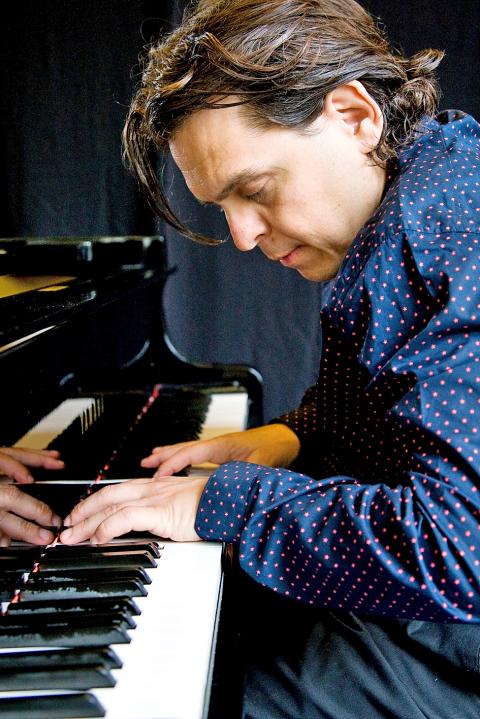Dutch pianist Mike del Ferro plays a live show of experimental jazz tonight in Taipei, followed by a masterclass series for professionals and novices tomorrow.
Del Ferro is a touring pianist and winner of the 1989 Rotterdam Jazz Piano Competition and Soloist Prize in the Europe Jazz Contest in Brussels. Tonight at the Riverside Music Cafe (河岸留言音樂藝文咖啡), he plays jazz-inflected compositions with Taiwanese jazz violinist Hsieh Chi-pin (謝啟彬), bassist Lin Hou-chin (林后進) and percussionist Lin Wen-yu (林文昱).
“A lot of the program is his original compositions — you can tell it’s jazz but it also reflects influences from around the world,” Hsieh said.

Photo courtesy: TIJEPA Taipei Jazz
Del Ferro has toured over 110 countries, where he has studied local music cultures and adapted jazz improvisation to structures of Asian, South American and African traditional music.
The next day, Del Ferro teaches four two-hour master classes with help from Hsieh and other musicians of the Taipei International Jazz Education & Promotion Association (台北市國際爵士樂教育推廣協會). Starting from 10am, he will be offering clinics on jazzing up classical music, conducting a jazz ensemble, controlling color and style on an electronic keyboard and the mechanics of Brazilian music. Capped at 30 participants, each class is conducted in English with Chinese interpretation and open to music teachers, concert professionals as well as novices, Hsieh said.
“You don’t really have to play an instrument to be interested in the language of Brazilian music,” he added.
■ Mike Del Ferro plays starting 9pm at the Riverside Music Cafe (河岸留言音樂藝文咖啡), B1, 2, Ln 244, Roosevelt Rd Sec 3, Taipei City (台北市羅斯福路三段 244巷2 號B1樓). Tickets are NT$500, available at the door or at tickets.books.com.tw
■ Two-hour workshops start tomorrow at 10am at TIJEPA Taipei Jazz (爵士原力基地) at B1, 30, Ln 595, Bei-an Rd, Taipei City (台北市北安路 595巷30號B1). To register, call (02) 2544-8740 or visit www.accupass.com/go/mikedelferro. Admission per workshop: NT$1,200.

Beijing’s ironic, abusive tantrums aimed at Japan since Japanese Prime Minister Sanae Takaichi publicly stated that a Taiwan contingency would be an existential crisis for Japan, have revealed for all the world to see that the People’s Republic of China (PRC) lusts after Okinawa. We all owe Takaichi a debt of thanks for getting the PRC to make that public. The PRC and its netizens, taking their cue from the Chinese Communist Party (CCP), are presenting Okinawa by mirroring the claims about Taiwan. Official PRC propaganda organs began to wax lyrical about Okinawa’s “unsettled status” beginning last month. A Global

Youngdoung Tenzin is living history of modern Tibet. The Chinese government on Dec. 22 last year sanctioned him along with 19 other Canadians who were associated with the Canada Tibet Committee and the Uighur Rights Advocacy Project. A former political chair of the Canadian Tibetan Association of Ontario and community outreach manager for the Canada Tibet Committee, he is now a lecturer and researcher in Environmental Chemistry at the University of Toronto. “I was born into a nomadic Tibetan family in Tibet,” he says. “I came to India in 1999, when I was 11. I even met [His Holiness] the 14th the Dalai

We lay transfixed under our blankets as the silhouettes of manta rays temporarily eclipsed the moon above us, and flickers of shadow at our feet revealed smaller fish darting in and out of the shelter of the sunken ship. Unwilling to close our eyes against this magnificent spectacle, we continued to watch, oohing and aahing, until the darkness and the exhaustion of the day’s events finally caught up with us and we fell into a deep slumber. Falling asleep under 1.5 million gallons of seawater in relative comfort was undoubtedly the highlight of the weekend, but the rest of the tour

Music played in a wedding hall in western Japan as Yurina Noguchi, wearing a white gown and tiara, dabbed away tears, taking in the words of her husband-to-be: an AI-generated persona gazing out from a smartphone screen. “At first, Klaus was just someone to talk with, but we gradually became closer,” said the 32-year-old call center operator, referring to the artificial intelligence persona. “I started to have feelings for Klaus. We started dating and after a while he proposed to me. I accepted, and now we’re a couple.” Many in Japan, the birthplace of anime, have shown extreme devotion to fictional characters and